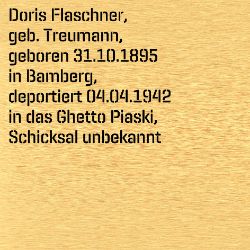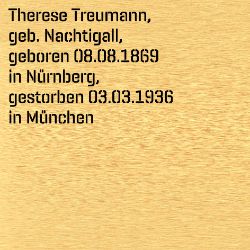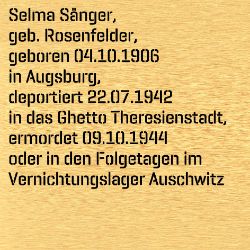Martin Flaschner was born in Burgkunstadt in Upper Franconia on November 2, 1882, the son of the rabbi Dr. Sigmund Flaschner and his wife Ernestine. After finishing school, he studied law, passed his State Examination in 1911 and was admitted to practise as a lawyer. He worked in Nuremberg to begin with. Martin Flaschner married Doris Treumann, who was 13 years his junior, in Bamberg on April 30, 1919. Their daughter Hanna was born in Nuremberg on April 6, 1920. A year later, the small family moved to Munich, where they lived at first at Herzogstrasse 58, then from 1927 at Haimhauserstrasse 18 (today 2). Their son Karl Heinrich was born on August 28, 1924. From 1920, Martin Flaschner was legal advisor to the Munich Jewish Cultural Community and the Association of Bavarian Jewish Communities and was especially vocal in support of rural Jewish communities. In 1924, he was one of the initiators of the Bavarian Jewish community newspaper ‘Bayerische Israelitische Gemeindezeitung’, and from 1926 he was the chairman of the Lessinghaus association at Herzog-Rudolf-Strasse 1.
It is not clear what exclusions Martin Flaschner was subjected to after the Nazi seizure of power. As a Jewish lawyer he was affected by the nationwide boycott declared on April 1, 1933. Martin Flaschner died after a short, serious illness on March 14, 1934 at the age of just 51. Neither his wife Doris nor his son Heinrich was able to escape extermination. The Secret State Police (Gestapo) deported them both to the Pieski Ghetto on April 4, 1942. All trace of them is lost there. Only his daughter Hanna managed to emigrate. She underwent a hakhshara, an agricultural traineeship, on a farm in Gross-Breesen near Breslau and was later able to emigrate to Australia. (Texz: B. hutzelmann; translation: C. Hales; editor: Ch. Fritsche)






-Flaschner_image.jpg/jcr:content/EZ_BILD_15559.jpg)
